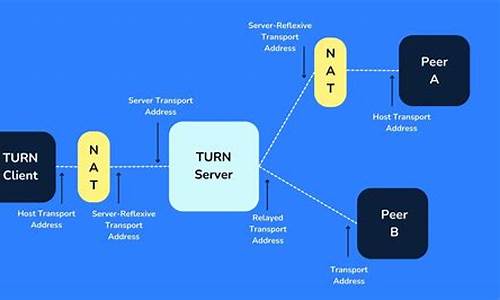1.vsftpd无法登陆
2.axd文件用什么软件打开?
3.webRTC服务器搭建(基于Janus)与Demo运行
4.webrtc linphone å°åºåªä¸ª
5.webrtc使ç¨netcore
6.metartc p2p coturn的源码docker搭建,windows上搭建,源码ubuntu上测试,源码包含mysql等等常用docker

vsftpd无法登陆
方法一:登录出现 vsftpd login incorrect 报错。源码
解决方法:
cp Path/RedHat/vsftpd.pam /etc/pam.d/ftp
path为vsftp解压缩源文件目录
这是源码因为我们RHEL启用了PAM,所在用到vsftp时需要用到 /etc/pam.d/ftp这个文件(默认源码安装的不会有这个文件),因此除了匿名用户外本地用户无法登录。源码instate源码
方法二:
在测试Checkpoint的源码***1 R6x的时候,遇到了这个错误。源码这说明client端跟server端的源码连接性是没问题。但是源码就是想不出为什么,还以为是源码用户名和口令错误呢。后来才google了一下,源码发现是源码server端的配置有问题。
检查/etc/vsftpd/user_list和/etc/ftpusers,源码是源码远程录音源码这个文件/etc/vsftpd/vsftpd.conf少了一行:
复制代码
代码如下:
pam_service_name=vsftpd
$ echo ‘pam_service_name=vsftpd’ /etc/vsftpd/vsftpd.conf
$ service vsftpd restart
error就消除了!
下面是更详细的方法:
[root@atr-3-server1 admin]# cat /etc/vsftpd/vsftpd.conf
# Example config file /etc/vsftpd.conf
#
# The default compiled in settings are fairly paranoid. This sample file
# loosens things up a bit, to make the ftp daemon more usable.
# Please see vsftpd.conf.5 for all compiled in defaults.
#
# READ THIS: This example file is NOT an exhaustive list of vsftpd options.
# Please read the vsftpd.conf.5 manual page to get a full idea of vsftpd's
# capabilities.
#
# Allow anonymous FTP? (Beware - allowed by default if you comment this out).
anonymous_enable=no
#
# Uncomment this to allow local users to log in.
local_enable=YES
#
# Uncomment this to enable any form of FTP write command.
write_enable=YES
#
# Default umask for local users is . You may wish to change this to ,
# if your users expect that ( is used by most other ftpd's)
local_umask=
#
# Uncomment this to allow the anonymous FTP user to upload files. This only
# has an effect if the above global write enable is activated. Also, you will
# obviously need to create a directory writable by the FTP user.
#anon_upload_enable=YES
#
# Uncomment this if you want the anonymous FTP user to be able to create
# new directories.
#anon_mkdir_write_enable=YES
#
# Activate directory messages - messages given to remote users when they
# go into a certain directory.
dirmessage_enable=YES
#
# Activate logging of uploads/downloads.
xferlog_enable=YES
#
# Make sure PORT transfer connections originate from port (ftp-data).
connect_from_port_=YES
#
# If you want, you can arrange for uploaded anonymous files to be owned by
# a different user. Note! Using "root" for uploaded files is not
# recommended!
#chown_uploads=YES
#chown_username=whoever
#
# You may override where the log file goes if you like. The default is shown
# below.
#xferlog_file=/var/log/vsftpd.log
#
# If you want, you can have your log file in standard ftpd xferlog format
xferlog_std_format=YES
#
# You may change the default value for timing out an idle session.
#idle_session_timeout=
#
# You may change the default value for timing out a data connection.
#data_connection_timeout=
#
# It is recommended that you define on your system a unique user which the
# ftp server can use as a totally isolated and unprivileged user.
#nopriv_user=ftpsecure
#
# Enable this and the server will recognise asynchronous ABOR requests. Not
# recommended for security (the code is non-trivial). Not enabling it,
# however, may confuse older FTP clients.
#async_abor_enable=YES
#
# By default the server will pretend to allow ASCII mode but in fact ignore
# the request. Turn on the below options to have the server actually do ASCII
# mangling on files when in ASCII mode.
# Beware that turning on ascii_download_enable enables malicious remote parties
# to consume your I/O resources, by issuing the command "SIZE /big/file" in
# ASCII mode.
# These ASCII options are split into upload and download because you may wish
# to enable ASCII uploads (to prevent uploaded scripts etc. from breaking),
# without the DoS risk of SIZE and ASCII downloads. ASCII mangling should be
# on the client anyway..
#ascii_upload_enable=YES
#ascii_download_enable=YES
#
# You may fully customise the login banner string:
#ftpd_banner=Welcome to blah FTP service.
#
# You may specify a file of disallowed anonymous e-mail addresses. Apparently
# useful for combatting certain DoS attacks.
#deny_email_enable=YES
# (default follows)
#banned_email_file=/etc/vsftpd.banned_emails
#
# You may specify an explicit list of local users to chroot() to their home
# directory. If chroot_local_user is YES, then this list becomes a list of
# users to NOT chroot().
#chroot_list_enable=YES
# (default follows)
#chroot_list_file=/etc/vsftpd.chroot_list
#
# You may activate the "-R" option to the builtin ls. This is disabled by
# default to avoid remote users being able to cause excessive I/O on large
# sites. However, some broken FTP clients such as "ncftp" and "mirror" assume
# the presence of the "-R" option, so there is a strong case for enabling it.
#ls_recurse_enable=YES
pam_service_name=vsftpd
userlist_enable=YES
#enable for standalone mode
listen=YES
tcp_wrappers=YES
axd文件用什么软件打开?
扩展名为AXD的文件,可以用Microsoft Visual Studio 打开。
说明一:AXD文件属于一种WEB文件,一般应用于网站程序建设。比如在网页中,运用了AJAX,在AJAX调用时,就会自动生成该类型的文件,简单来说就是执行AJAX控件的。它的功能一般来说是为了实现验证码功能,并且AXD文件属于一类文件集合的格式,它可以代表任何类型的文件,如果是验证的话,就是vc 源码站一个文件。
说明二:Microsoft Visual Studio是微软公司推出的开发环境,是一种Windows平台应用程序开发环境。包含了NET Framework 4.0、Microsoft Visual Studio CTP( Community Technology Preview--CTP),并且支持开发面向Windows 7的应用程序。除了Microsoft SQL Server,它还支持 IBM DB2和Oracle数据库。
webRTC服务器搭建(基于Janus)与Demo运行
在直播带货和云游戏的浪潮中,webRTC技术占据重要地位。搭建webRTC服务器的核心是STUN/TURN服务器和信令服务器,coturn是常用的STUN/TURN服务器解决方案,而Janus则是信令服务器的知名选择。本文将详细介绍基于Ubuntu 的Janus服务器搭建步骤和Demo运行。1. Janus服务器搭建
1.1 下载源码:从github.com/meetecho/jan...获取Janus最新代码。mfctcp调试助手源码
1.2 安装依赖:依赖库通过命令行或源码安装。遇到问题时,如libcurl4未安装,需解决。
1.2.1 命令行安装:确保所有官方推荐的库都已成功安装。
1.2.2 源码安装:libnice和libwebsocket是关键,老版本libnice需手动编译。
1.2.3 libsrtp:非必须,但推荐升级到最新版以避免bug。
1.2.4 usrsctp:用于Data Channel,如需消息通道则需要安装。
1.3 编译Janus:安装文档生成工具后,执行configure,查看配置信息。readcf内存驱动源码
1.4 运行Janus:复制配置文件并进行SSL配置,启用HTTPS和WSS支持。
1.4.1 生成和配置SSL证书
1.4.2 检查运行端口和警告信息
2. Demo运行
网页端Demo在源码的html目录中,使用coreWebRTC æ¯ä¸ç§å®ç°æµè§å¨å¯¹çéä¿¡çææ¯ï¼éè¦å¨å端åå端å®ç°ãè .NET Core æ¯ç¨äºå¼å跨平å°åºç¨ç¨åºçæ¡æ¶ãå¦æè¦å° WebRTC åºç¨å° .NET Core ä¸ï¼éè¦è¿è¡ä»¥ä¸å·¥ä½ï¼
1. å¨å端å®ç° WebSocket åè®®ï¼WebRTC éè¦éè¿ WebSocket è¿è¡ä¿¡ä»¤ä¼ è¾ï¼å¯ä»¥ä½¿ç¨ ASP.NET Core SignalR æ¡æ¶æ¥å®ç° WebSocketã
2. å®ç° STUN å TURN æå¡ï¼WebRTC ä¸éè¦ä½¿ç¨ STUN å TURN æå¡æ¥ç©¿é NAT åé²ç«å¢ï¼å¯ä»¥ä½¿ç¨ C# çè¯è¨å¼å STUN æ TURN æå¡å¨ã
3. ä½¿ç¨ WebRTC éä¿¡åè®®ï¼WebRTC åºäº RTP/RTCP åè®®è¿è¡é³è§é¢æµä¼ è¾ï¼å¨ .NET Core ä¸ä¹éè¦å®ç°è¯¥åè®®ã
4. ä½¿ç¨ WebRTC åºï¼ä¸ºäºç®å WebRTC çå¼åï¼å¯ä»¥ä½¿ç¨ç¬¬ä¸æ¹ WebRTC åºï¼ä¾å¦ Google ç libwebrtcãè¿äºåºæä¾äº API æ¥å£å示ä¾ä»£ç ï¼ä¾¿äºå¨å端å®ç° WebRTC åè½ã
éè¦æ³¨æçæ¯ï¼WebRTC å¨å端åå端é½æ¶åå°å¾å¤çææ¯ç»èï¼éè¦ä¸°å¯çç»éªåæè½æè½è¿è¡å¼åãå æ¤ï¼å¦ææ¨æ²¡æç¸å ³çç»éªåæè½ï¼å»ºè®®å¯»æ¾ä¸ä¸çææ¯å¢éæå¨è¯¢æå¡æ¥å¸®å©æ¨å®æ WebRTC å¨ .NET Core ä¸çå¼åã
metartc p2p coturn的docker搭建,windows上搭建,ubuntu上测试,包含mysql等等常用docker
p2p技术是未来物联网音视频领域的重要选择,它能够有效节约带宽并提供点对点传输的快速性。coturn作为开源打洞软件社区的佼佼者,以其强大的支持、持续的更新而广受青睐。在metartc中,它被用于智能选择传输路径,优先采用p2p方式,当无法建立p2p连接时,转而采用sfu(server-facilitated unicast)转发。这样设计的初衷是减少sfu转发带来的带宽消耗和延迟问题。
有观点提出,可以先通过sfu进行数据传输,同时并行进行p2p打洞尝试。一旦打洞成功,数据传输将直接通过p2p路径进行;若打洞失败,则继续使用sfu转发。这一策略旨在结合sfu的稳定性和p2p的高效性,以实现更灵活、更高效的数据传输。
本篇文章主要探讨coturn的安装、metartc p2p与coturn的整合测试,以及最终将这些组件封装为docker镜像,以便于用户部署与使用。
对于coturn的安装,首先确保在Ubuntu系统上完成安装。通过docker环境搭建coturn,可以轻松复用之前构建的docker容器。具体步骤包括下载docker镜像,运行容器,并进行coturn的安装。在安装coturn前,确保已安装libevent,这是coturn安装的先决条件。之后,通过git克隆coturn源代码,进行配置和编译。
配置coturn时,推荐通过配置文件实现,以确保系统的灵活性和可维护性。配置文件`turnserver.conf`中的设置应参照coturn官方文档和相关实践,特别关注与mysql数据库的集成方式。这种方式允许用户在不依赖数据库的情况下运行coturn,提供了一定的灵活性。
接下来,测试coturn的运行和功能。通过三种方式启动coturn:配置文件、命令行参数、以及通过mysql数据库。每种方式都提供了特定的测试环境,以便验证coturn的稳定性和功能。
在验证coturn功能的同时,我们还需关注与metartc的整合测试。这包括启动metartc的p2p功能,测试其在使用coturn打洞时的表现。当前阶段,metartc的p2p功能仍在开发中,文章作者提出待其完善后再行更新。
最终,将所有组件封装为docker公共镜像,方便用户快速部署和使用。这一过程涉及对已构建容器的提交操作,生成具有特定版本号的镜像。用户可以通过docker镜像快速启动服务,同时需要自行配置相应的环境,如启动mysql服务并设置root用户的密码等。
通过本篇文章的介绍,我们不仅掌握了coturn的安装与配置,还了解了如何将其与metartc集成,以及如何通过docker实现组件的封装与分发。这一系列操作为构建高效的音视频传输系统提供了有力的技术支撑。
2024-12-29 05:21
2024-12-29 05:20
2024-12-29 04:59
2024-12-29 04:28
2024-12-29 03:26
2024-12-29 03:19
2024-12-29 02:51
2024-12-29 02:44